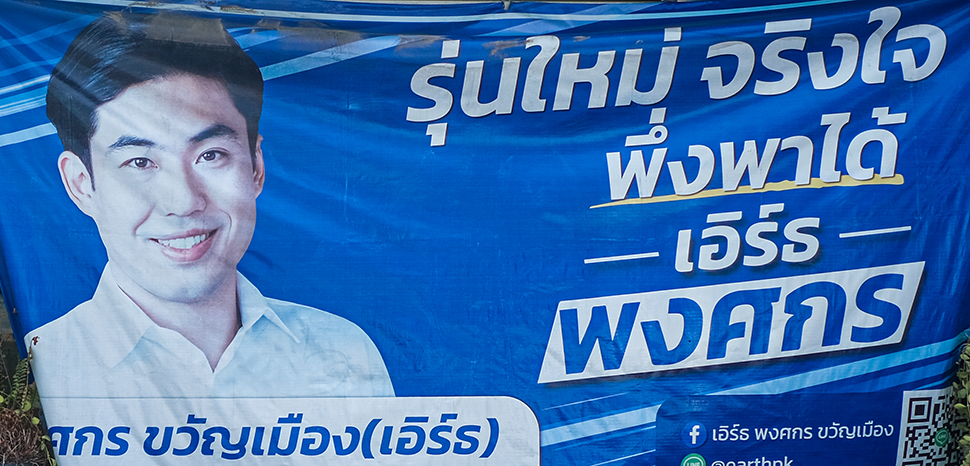If you touch it, you die.
That’s the supposed result for politicians who confront highly contentious issues. Likened to grasping the “third rail,” the one that provides the electricity that powers a train or subway, the result is political suicide—at least that was the metaphor attributed to U.S. House Speaker Thomas “Tip” O’Neill when discussing the topic of Social Security in the early 1980s, as any politician attempting to reform the largest social safety net for retired American workers would later cost them their political careers at the ballot box.
Pita Limjaroenrat, the prime ministerial candidate of the progressive Move Forward Party, which upset Thailand’s conservative military-backed parties in the May 14 election, also touched on a sensitive national issue: lèse-majesté. In the end it was responsible in part in ending his chances at becoming prime minister, as Thailand’s Constitutional Court suspended his duties as a member of Parliament, and was blocked from a second parliamentary vote. Two lingering questions remain after a month of post-election drama: whether pushing for Article 112 reform so soon was worth it, and whether Move Forward had the foresight to predict this outcome.
Known in Thailand as Article 112 of the Criminal Code, lèse-majesté (royal insult) dates back to 1908 and warns that anyone who “defames, insults or threatens the king, the queen, the heir-apparent or the regent” is punishable by up to 13 years in prison. The vaguely worded law provides a wide interpretation as to what constitutes an insult, giving those who weaponize it great flexibility. With anyone being able to file a complaint and the police mandated to investigate claims, Article 112 is not only worrisome for Thais, but has become an issue of international concern. Many have fallen victim, even children, as the military government of Prayut Chan-ocha sought to crack down on dissent. In 2020, he vowed in 2020 to “use all laws, all articles, to take action against protesters who broke the law,” referring then to protesters who defied police use of water cannons and tear gas.
Move Forward first signaled it would call for the repeal of Article 112 in January 2021, taking up a popular challenge from anti-coup and pro-reform protests that began in 2020, and a day after four prominent protest leaders were charged under the law. When submitted before Parliament in February 2021, Move Forward’s reform attempt was rejected on grounds it violated Article 6 of the 2017 Constitution which states that “The King shall be enthroned in a position of revered worship and shall not be violated.”
With property tycoon Srettha Thavisin poised to take the helm after Pita’s departure, what motivated Move Forward to repeal Article 112, knowing that the odds against them were insurmountable?
Arguments can be made on ideological or political grounds. First, Move Forward has been guided by the support of young progressive Thais who were actively engaged in largely youth-led protests beginning in 2020 and who were willing to both demonstrate and discuss politically taboo issues, Article 112 chief among them. Some of those protesters became political candidates themselves. Not pursuing lèse-majesté reform would violate the trust of voters on ideological grounds. The recent submission of seven bills “for change” was a clear message to Thai voters that they intended to push for change as a part of a perceived public mandate, regardless of the outcome.
Move Forward also likely thought in the aftermath of their electoral upset, where 75 percent of Thais turned out to vote that they had earned the political capital and backing from the electorate that the risk of political turmoil and public discontent would be enough to persuade some conservatives to allow a Move Forward-Pheu Thai coalition government.
Antagonism also might be a part of Move Forward’s DNA. It has been bolder than any other political party, having the audacity in August 2021 to propose cutting the budget of agencies related to the Crown, suggesting that the monarchy’s budget lacked transparency and suggested a range of cuts as high as 40 percent.
The predicament that Move Forward now faces is the direct result of deliberately touching Thailand’s third rail. However, unlike in America where consequences come from an angry voting public at the ballot box, in Thailand blowback emanates from an entrenched establishment with a firm grip on the art of extra-constitutional intervention and the implementation of perfectly legalized cheating. Yet Move Forward, ostensibly, didn’t have the foresight to see these circumstances or have the wisdom to pave a more pragmatic path to power.
It is unclear whether Move Forward ever considered a more pragmatic alternative, such as shelving Article 112 temporarily, in hopes of gaining political capital first. In March, there were reports that a “watered down” version of a reform bill could be considered, as both it and Pheu Thai were competing for the same segment of anti-coup voters and were worried it might affect their chance of being a part of a Pheu Thai-led majority government. Further, four days after the election, the Move Forward announced that agreement with their position on Article 112 was not a precondition for joining the coalition and was not a part of the MoU agreed upon by all eight coalition partners. Yet even then, in late May, Pita reiterated that Move Forward would persist, suggesting that “when the time comes, [we] will be alone.”
In the run up to the prime ministerial vote, Pita on several occasions mentioned his party’s intention to bring attention to lèse-majesté, repeating the view of many that the law was being used as a weapon of intimidation. And during the July 13 vote, Move Forward’s Secretary General Chaithawat Thulathon explained during a speech the party’s view that if Article 112 is not amended now, it will become a “ticking time bomb” that will soon explode and that the party could not abandon its conscience, partially embedded in the principle of freedom of expression.
Pita’s pro-democracy rivals did seek a more pragmatic path. Pheu Thai, as early as March set an ambitious target of 310 lower House seats, revising a previous target of 250 in an effort to form a single-party majority government. And to their credit, even though the eventual outcome was disappointing, they tried to buy themselves some insurance by selecting Srettha as a candidate for two reasons: to dissuade voters from isolating them as a Thaksin-controlled party, evidenced by the nomination of the youngest daughter of the exiled former Prime Minister, Paetongtarn Shinawatra, and to extend their appeal to working class voters overwhelmed with economic concerns, including crippling household debt.
Article 112 was arguably key to Move Forward’s electoral surprise, but in an unfair political environment, being doggedly persistent is what spelled their doom. Rather than transition from campaigning to governing, Move Forward kept pressing the issue. It promised not to back down, even as Pheu Thai urged them to abandon the reform goal from their MoU.
Part of the ire that Move Forward’s Article 112 reform proposals have drawn also comes from historic linkages that have united conservatives for decades and made demons of liberals. In the 1970s, the monarchy was synonymous with anti-Communism and pro-democracy supporters were labeled as subversives and traitors by royalist paramilitary organizations. The party colored itself in ideologies and imagery of a tragic past, drawing criticism and giving conservatives added impetus that it needed to countermobilize. Taking imagery that originated from protest movements in 2020, Move Forward embraced the “hammer and sickle,” and predictably, was again challenged by conservatives through Thailand’s flawed legal system.
Move Forward’s persistence on Article 112 has been matched by equal conservative resistance, with dual challenges from Thailand’s Constitutional Court, arguably a defender of conservative interests, on grounds of lèse-majesté and a petition filed by conservative activist Theerayut Suwankesorn. Observers of Thai politics understand how resolute conservative politicians can be. Thai conservatives are deeply rooted in the state ideology of “nation, religion, and king”, and take cues from a tradition of loyalty, obedience, and the belief that the King is above politics. As junta-appointed Senator and businessman Seree Suwanpanont remarked, “It’s clear that this operation is aiming to overthrow [the monarchy]. How can we, the senators, support you to do this?”
By Pita’s grasping of the third rail, Thailand will soon find out how far the establishment will go to protect its own. Move Forward may soon face the same fate as their predecessor Future Forward—oblivion.
The views expressed in this article belong to the authors alone and do not necessarily reflect those of Geopoliticalmonitor.com.




